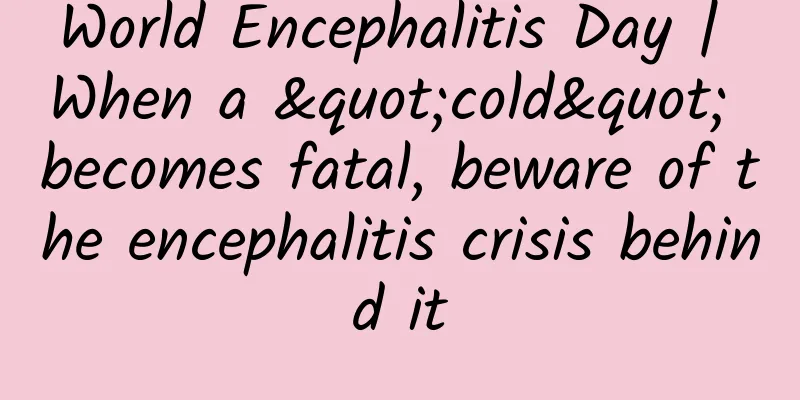World Encephalitis Day | When a "cold" becomes fatal, beware of the encephalitis crisis behind it

|
February 22nd of every year is World Encephalitis Day. The author learned from the Department of Critical Care Medicine of Brain Diseases of Hunan Second People's Hospital (Provincial Brain Hospital) that when fever, cough, mental confusion and sudden convulsions occur at the same time, it may not be ordinary flu, but a deadly crisis hidden: severe encephalitis . From cold to coma: the immune system's deadly mutiny 19-year-old Xiao Ma (pseudonym) initially thought he had the flu due to repeated low-grade fever, but 20 days later he suddenly had whole-body convulsions and fell into a coma. The Department of Critical Care Medicine of the Second People's Hospital of Hunan Province (Provincial Brain Hospital) diagnosed that this "flu" was actually autoimmune encephalitis (AE) - the immune system mistook brain neurons for enemies, triggering a "civil war" in the nervous system. Not only will patients suddenly experience psychiatric symptoms such as a cliff-like decline in memory and paranoia, but they may also be in danger of life due to complications such as status epilepticus and cerebral edema. Three deadly traps of encephalitis 1. Strong camouflage The initial symptoms are highly similar to those of a cold: fever (82%), headache (76%), and fatigue (65%) are easily ignored. However, if the following "warning signs" are combined, you need to seek medical attention immediately: abnormal mental behavior (such as nonsense, sudden personality changes, etc.); short-term memory loss (such as forgetting what you just said); limb twitching or changes in consciousness. 2. Rapid progress Viruses or autoimmune reactions can cause brain edema within 48 hours, leading to brain herniation. Data show that the mortality rate of patients with severe encephalitis who are not treated in time is as high as 40%, and 30-50% of the survivors have sequelae such as epilepsy and cognitive impairment. 3. Young people are at high risk People aged 15-35 account for 60% of AE cases, and their active immune systems may "accidentally injure" the brain when fighting against viruses. According to data, about 60-70% of patients with severe encephalitis were misdiagnosed as "colds" or "mental illnesses" when they were first diagnosed. Race against time: How the intensive care unit turned the tide Xiao Ma's successful treatment was due to the four life-saving lines of the Department of Critical Care Medicine for Brain Diseases: 1. Precision sniping techniques Through cerebrospinal fluid antibody testing (the gold standard for diagnosis) + magnetic resonance imaging, the inflammation area can be accurately located and the cause of the disease can be identified within 48 hours. 2. Multi-dimensional immune regulation A combination therapy of "hormone shock + immunoglobulin + plasma exchange" is used to quickly eliminate abnormal antibodies that attack neurons. 3. All-weather brain function protection Equipment such as intracranial pressure monitoring and video EEG provide real-time warning of cerebral edema and epileptic storm, and bedside CRRT (continuous renal replacement therapy) can quickly stabilize the internal environment and alleviate the inflammatory storm. 4. Early neurorehabilitation intervention Cognitive training, intensive care rehabilitation and other treatments were initiated 72 hours after the condition stabilized, significantly reducing the incidence of sequelae. Seize the "golden 72 hours": be alert to these symptoms Zhou Gaoya, director of the Department of Critical Care Medicine for Brain Diseases at the Second People's Hospital of Hunan Province (Provincial Brain Hospital), reminds: When a cold patient has any of the following symptoms, he or she should immediately go to a hospital with neurological intensive care capabilities: 1) Body temperature > 39°C and confusion 2) The twitching lasts for more than 5 minutes 3) Hallucinations or aggressive behavior 4) Stiff neck and projectile vomiting On the occasion of World Encephalitis Day, Director Zhou Gaoya reminded that encephalitis is not an "old age disease" and young people need to be more vigilant against the "defection" of the immune system. Every splitting headache from staying up late to work overtime and every "little cold" that you have to endure may become the last straw that breaks the camel's back for the nervous system. Timely identification of warning signals and selection of medical institutions with neurocritical care capabilities are the keys to rewriting the outcome of life and death. Let us work together to improve our understanding of encephalitis and protect our brain health. Hunan Medical Chat Special Author: Chen Shengnan and Li Jing, Department of Critical Care Medicine for Brain Diseases, Hunan Second People's Hospital (Provincial Brain Hospital) Follow @湖南医聊 to get more health science information! (Edited by YT) |
Recommend
Insomnia, irritability, frequent headaches...People with these symptoms should pay attention!
Expert of this article: Wang Li, attending physic...
What is the cause of vaginitis and cervical erosion?
Health is an eternal topic. When our food and clo...
What is the reason for brown discharge a few days after menstruation?
Every woman will have menstruation. This is a nat...
What fruits are better to eat during menstruation?
Many female friends like to eat fruits because th...
Is it easy to have a boy if you have sex on the day of ovulation?
Many families still have traditional ideas, such ...
What if it is an ectopic pregnancy?
Anyone who has done their homework seriously know...
How many eggs can a woman release during ovulation?
Generally speaking, women will release one egg du...
Are potatoes potatoes? How to store potatoes in summer without them turning green or growing teeth?
Potatoes are native to the Andes Mountains in Sou...
What is the reason for leucorrhea and blood in 35 days of pregnancy?
This period is very important for many pregnant w...
Why do I have a bad odor in my lower body recently?
The female private parts are the most important p...
What is the cause of ovarian masses? Is it closely related to genetics?
Some friends believe that ovarian masses are clos...
How to restore a big belly after cesarean section
Many female friends will feel distressed about th...
Non-gonococcal vaginitis symptoms
Many people feel ashamed after developing non-gon...
Can breast tumors be cured?
The so-called breast tumor, which is medically ca...
What are the health products for ovarian maintenance?
Having a baby is every woman's dream, but man...









